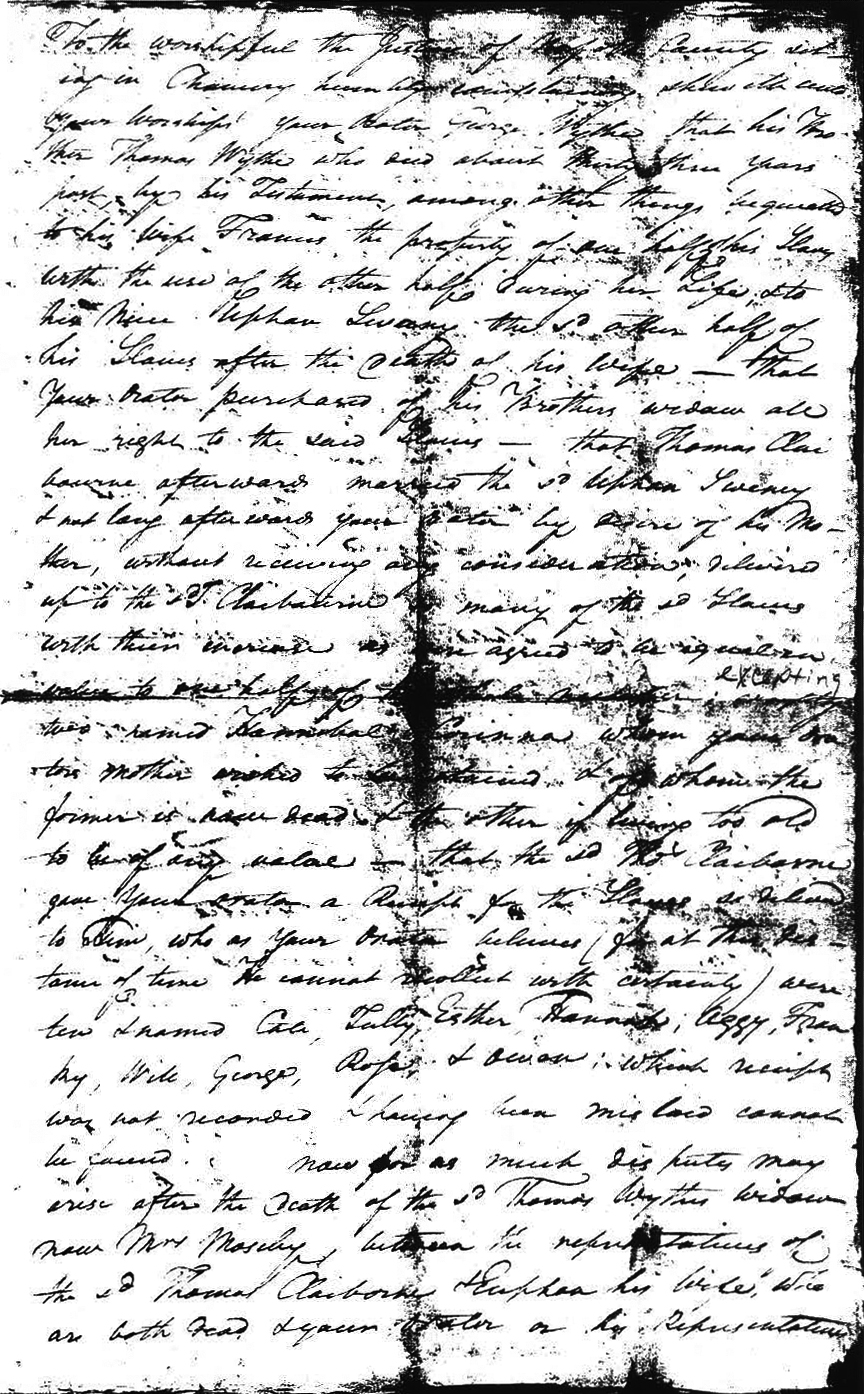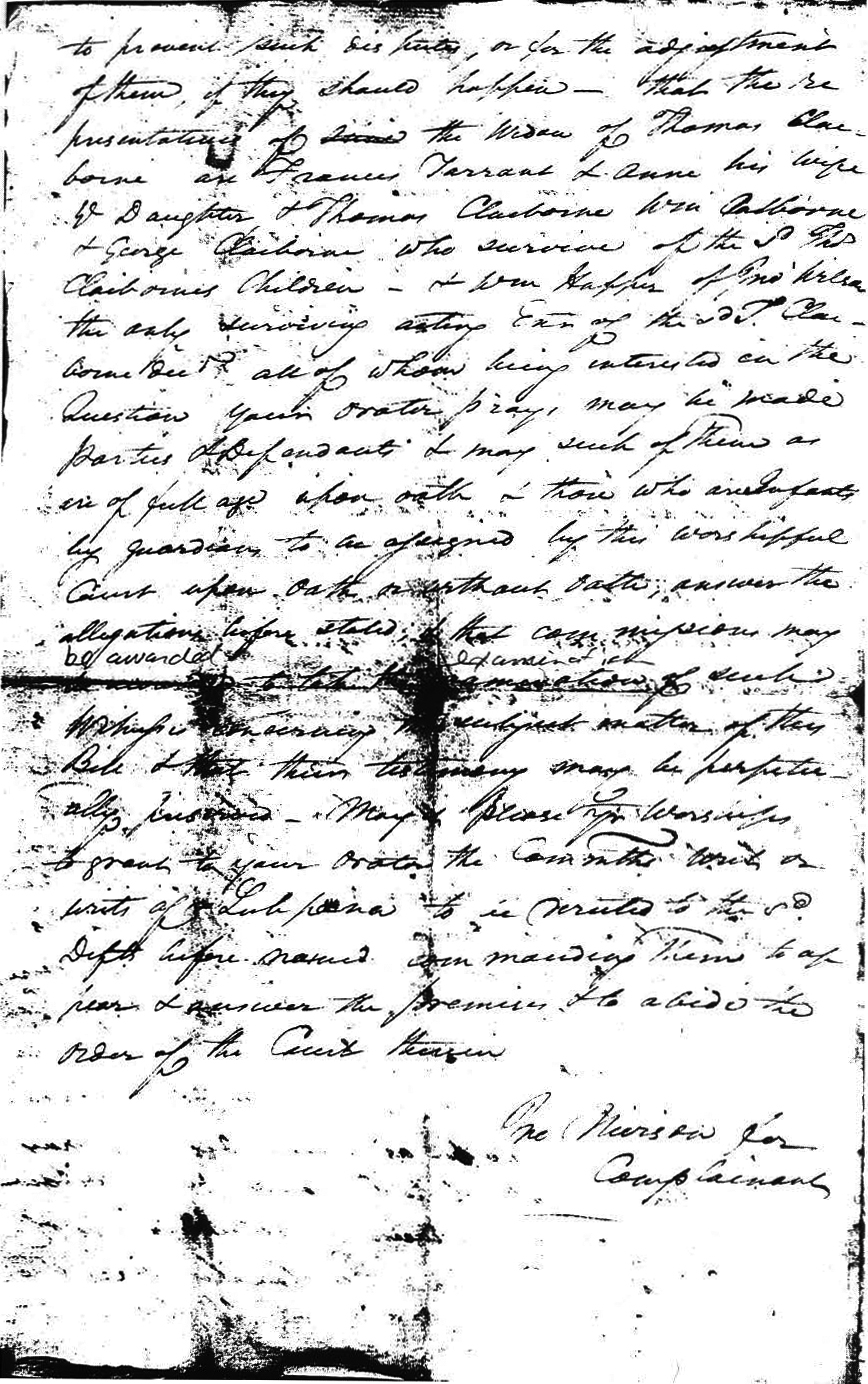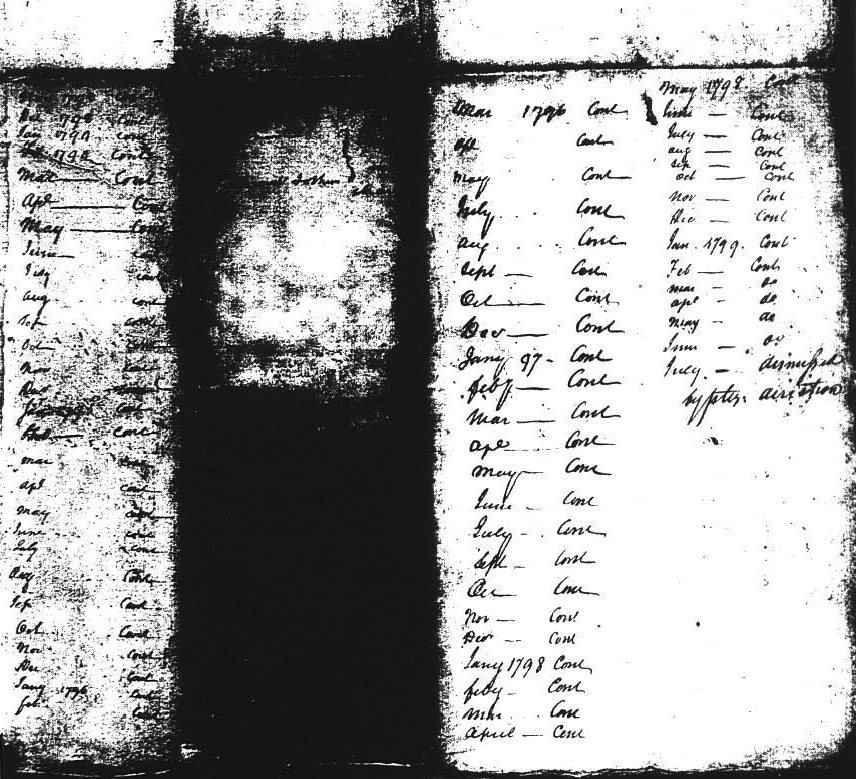Difference between revisions of "Complaint regarding the estate of Frances Wythe"
m (→Page 3 (docket)) |
m |
||
| Line 5: | Line 5: | ||
The slaves originally belonged to Wythe's older brother, Thomas Wythe. In his will, Thomas Wythe bequeathed one half of his slaves to his wife Frances, and the other half for her use during her lifetime and thereafter to his niece, Euphan Sweeney. Euphan later married Thomas Claiborne, after which Wythe delivered to them one half of Thomas Wythe's slaves (but before the death of Frances, who remarried and still living). Upon delivery of the slaves, George Wythe was issued a receipt, which was later mislaid. The complaint seeks to avoid any disputes regarding the slaves by asking the High Court of Chancery to seek testimony of witnesses, and to declare that he lawfully met the requirements of his brother's will. | The slaves originally belonged to Wythe's older brother, Thomas Wythe. In his will, Thomas Wythe bequeathed one half of his slaves to his wife Frances, and the other half for her use during her lifetime and thereafter to his niece, Euphan Sweeney. Euphan later married Thomas Claiborne, after which Wythe delivered to them one half of Thomas Wythe's slaves (but before the death of Frances, who remarried and still living). Upon delivery of the slaves, George Wythe was issued a receipt, which was later mislaid. The complaint seeks to avoid any disputes regarding the slaves by asking the High Court of Chancery to seek testimony of witnesses, and to declare that he lawfully met the requirements of his brother's will. | ||
| − | This complaint is the first known document which approximates a year of death for George Wythe's brother, Thomas (c. 1760).<ref>The microfilm states the case begins in 1791, | + | This complaint is the first known document which approximates a year of death for George Wythe's brother, Thomas (c. 1760).<ref>The microfilm states the case begins in 1791, however, the court docket on page three is obscured at best, but seems to be continuous — if complete — and starts in November, 1793. Thomas Wythe is stated to have died 33 years prior.</ref> Further, the complaint reveals Thomas's wife, Frances, lived until at least 1793 and had by that time remarried into the Mosby family. |
==Document text, circa 1793== | ==Document text, circa 1793== | ||
Revision as of 15:32, 19 February 2018
This complaint filed by George Wythe in late 1793, anticipating a dispute regarding slaves given to his deceased niece, Euphan Sweeney Claiborne.[1] Twelve slaves are named in the document.[2]
The slaves originally belonged to Wythe's older brother, Thomas Wythe. In his will, Thomas Wythe bequeathed one half of his slaves to his wife Frances, and the other half for her use during her lifetime and thereafter to his niece, Euphan Sweeney. Euphan later married Thomas Claiborne, after which Wythe delivered to them one half of Thomas Wythe's slaves (but before the death of Frances, who remarried and still living). Upon delivery of the slaves, George Wythe was issued a receipt, which was later mislaid. The complaint seeks to avoid any disputes regarding the slaves by asking the High Court of Chancery to seek testimony of witnesses, and to declare that he lawfully met the requirements of his brother's will.
This complaint is the first known document which approximates a year of death for George Wythe's brother, Thomas (c. 1760).[3] Further, the complaint reveals Thomas's wife, Frances, lived until at least 1793 and had by that time remarried into the Mosby family.
Contents
Document text, circa 1793
Page 1
To the worshipful the Justices of Norfolk County siting in Chancery humbly complaining excellency sheweth unto by your worships your Orator George Wythe that his Brother Thomas Wythe who died about thirty three years past, by his Testament, among other things bequeathed to his wife Frances the property of one half his Slaves with the use of the other half during her Life; & to his Neice, Uphan Sweny the s'd other half of his Slaves after the death of his Wife — that Your Orator purchased of his Brothers widow all her rights to the said slaves — that Thomas Claiborne afterwards married the said Uphan Sweny, & not long afterwards Your Orator by desire of his Mother, without receiving any consideration, delivered up to the s'd T. Claiborne so many of the s'd Slaves with their increase as are agreed to be equal in value to one half of [text obscured] excepting two named Hannibal & Corinna who your orator's Mother wished to be retained & of whom the former is now dead & the other is living too old to be of any value — that the s'd Thos. Claiborne gave Your Orator a Receipt for the Slaves as delivered to Him, who as Your Orator believes (for at this distance of time he cannot recollect with certainty) were ten named Cate, Tally, Esther, Hannah, Aggy, Franky, Will, George, Ross, & Owen; which receipt was not recorded & having been mislaid cannot be found. Now for as much disputes may arise after the death of the s'd Thomas Wythes widow now Mrs Mosby between the representatives of the s'd Thomas Claiborne Euphan his Wife, who are both dead & your Orator or his Representatives
Page 2
to prevent such disputes, or for the adjustment of them, if they should happen — that the representatives of the Widow of Thomas Claiborne are Francis Tarrant & Anne his Wife & Daughter & Thomas Claiborne Wm. Claiborne & George Claiborne who survive of the s'd Thos. Claiborne's Children — & Wm. Happer of Jno. Wilson the only surviving acting Exr. of the s'd T. Claiborne dec'd all of whom being interested in the Question Your Orator pray, may he made parties & Defendants & may such if them as are of them are of full age upon oath & those who are Infants by guardian to be assigned by this worshipful Court upon oath or without oath, answer the allegations before stated; & that commissions may be awarded to take the examinations of such witnesses concerning the subject matter of this Bill & that their testimony may be perpetually preserved — May it please Yr. Worships to grant to your Orator the Commths writ or writs of Subpoena to be directed to the s'd Defts. before named commanding them to appear & answer the premises & to abide the order of the Court therein
Jno. Neirson for
Complaintant
Page 3 (docket)
Nov 1793[?] — Cont Mar — 1796 Cont May 1798 — Cont Dec 1793 — Cont Apl — Cont June — Cont Jan 1794 — Cont [Plaintiff and May — Cont July — Cont Feb 1794 — Cont defendant's names } July — Cont August — Cont Mar — Cont illegible] Aug — Cont Sep — Cont Apl — Cont Sept — Cont Oct — Cont May — Cont Oct — Cont Nov — Cont June — Cont Dec — Cont Dec — Cont July — Cont Jany 97 — Cont Jan 1799. — Cont Aug Cont Feby — Cont Feb — Cont Sep — Cont Mar — Cont March — do. Oct — Cont Apl — Cont Apl — do. Nov — Cont May — Con May — do. Dec — Cont June — Cont June — do. Jan 1795 [?] — Cont July — Cont July — dismissed Feb [?] — Cont Sept — Cont by pfts: [?] discretion Mar — Cont Oct — Cont Apl — Cont Nov — Cont May — Cont Dec - Cont June — Cont Jany 1798 — Cont July — Cont Feby — Cont Aug — Cont Mar — Cont Sep — Cont April — Cont Oct — Cont Jany 1798 — Cont Nov — Cont Febry — Cont Jany 1796 — Cont March — Cont Feb — Cont April — Cont
References
- ↑ Race, Slavery, and Free Blacks Microfilm, Series II, Petitions to Southern County Courts, 1775–1867, Part C: Virginia (1775–1867) and Kentucky (1790–1864), Reel 1, frame 0372-0375. Original at the Library of Virginia, Richmond.
- ↑ "Petition 21679103 Details," Race & Slavery Petitions Project, University of North Carolina at Greensboro.
- ↑ The microfilm states the case begins in 1791, however, the court docket on page three is obscured at best, but seems to be continuous — if complete — and starts in November, 1793. Thomas Wythe is stated to have died 33 years prior.
External links
- Race & Slavery Petitions Project, University of North Carolina at Greensboro.


